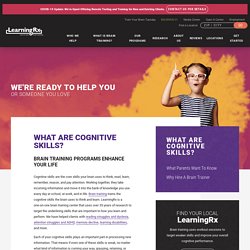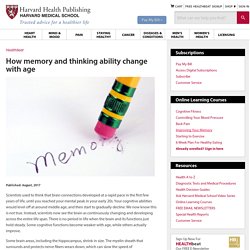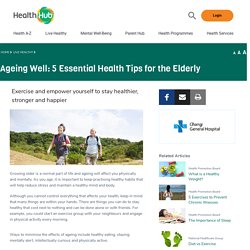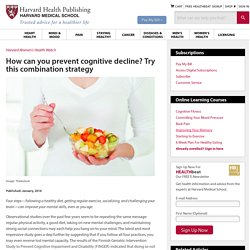

As we reach the older adult stage, it is important for us to understand the negative age-related changes in cognition such as:
- Generally slower mental processing
- Slower transformation of information for decision making
- Less efficient working memory and executive cognitive function
Apart from that, age-related diseases will accelerate the rate of cognitive decline which in worse cases develop cognitive impairments severe enough to impair day-to-day functional abilities.
However, emerging evidence shows that healthy lifestyles may decrease the rate of cognitive decline seen with aging. In this collection, you may increase the awareness of the above phenomenon as well as get some useful tips on possible prevention steps.
We can understand Cognitive Ability as... LearningRx Brain Training Center. Cognitive skills are the core skills your brain uses to think, read, learn, remember, reason, and pay attention.

Working together, they take incoming information and move it into the bank of knowledge you use every day at school, at work, and in life. Brain training trains the cognitive skills the brain uses to think and learn. LearningRx is a one-on-one brain training center that uses over 35 years of research to target the underlining skills that are important to how you learn and perform. We have helped clients with reading struggles and dyslexia, attention struggles and ADHD, memory decline, learning disabilities, and more. Videos on Cognitive Skills. What is COGNITIVE SKILL? What does COGNITIVE SKILL mean? COGNITIVE SKILL meaning & explanation. Cognitive Ability Assessment - Abstract Reasoning Test Tutorial video.
Cognitive ageing is also known as... Cognitive Aging: Cognitive Health and the Older Adult. Examples of mental functional deterioration due to old aging. 6 Ways that Thinking Changes with Aging (& What to Do About This) How memory and thinking ability change with age. Scientists used to think that brain connections developed at a rapid pace in the first few years of life, until you reached your mental peak in your early 20s.

Your cognitive abilities would level off at around middle age, and then start to gradually decline. We now know this is not true. Instead, scientists now see the brain as continuously changing and developing across the entire life span. There is no period in life when the brain and its functions just hold steady. Some cognitive functions become weaker with age, while others actually improve. Some brain areas, including the hippocampus, shrink in size. On the other hand, the branching of dendrites increases, and connections between distant brain areas strengthen.
Age is also the biggest risk factor for many brain diseases, most of which affect brain structure and function. Video on how brain changes and it's implications due to old age. Brain Changes in Older Adults. Activeageing scec. Video showing how exercising can help with cognitive abilities of older adults. Effects of Exercise on Cognitive Abilities of Older Adults.
Ageing Well: 5 Essential Health Tips for the Elderly. Growing older is a normal part of life and ageing will affect you physically and mentally.

As you age, it is important to keep practising healthy habits that will help reduce stress and maintain a healthy mind and body. Although you cannot control everything that affects your health, keep in mind that many things are within your hands. There are things you can do to stay healthy that cost next to nothing and can be done alone or with friends. For example, you could start an exercise group with your neighbours and engage in physical activity every morning. Ways to minimise the effects of ageing include healthy eating, staying mentally alert, intellectually curious and physically active. Health Tips for the Elderly Here are some health tips on how to stay healthier, stronger and happier in your golden years. 1. Eat a balanced, healthy diet. Make sure you get enough sleep. Moderate your consumption of alcohol and smoking. 2. Regular exercise need not be strenuous to achieve health benefits.
How can you prevent cognitive decline? Try this combination strategy. Image: Thinkstock Four steps—following a healthy diet, getting regular exercise, socializing, and challenging your brain—can improve your mental skills, even as you age.

Observational studies over the past few years seem to be repeating the same message: regular physical activity, a good diet, taking on new mental challenges, and maintaining strong social connections may each help you hang on to your mind. The latest and most impressive study goes a step further by suggesting that if you follow all four practices, you may even reverse lost mental capacity. The results of the Finnish Geriatric Intervention Study to Prevent Cognitive Impairment and Disability (FINGER) indicated that doing so not only kept cognitive skills from declining, it also improved reasoning skills and speed in performing mental tasks.
Physical and Cognitive activities as a form of prevention from cognitive declination. Physical activity to improve cognition in older adults: can physical activity programs enriched with cognitive challenges enhance the effects? A systematic review and meta-analysis. Cognitive Aging, Mild Cognitive Impairment & Clinical Alzheimer's-Type Dementia. Preventing Cognitive Decline and Dementia: A Way Forward. Practical Takeaways & What we can do. PIIS0003999304003971.
Reference.